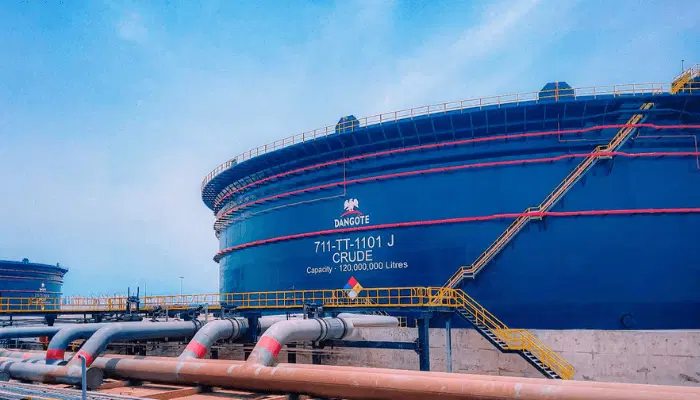On October 21, 2025, Nigeria’s House of Representatives vowed to mediate a heated dispute between the Petroleum and Natural Gas Senior Staff Association of Nigeria (PENGASSAN) and the Dangote Refinery, which has disrupted fuel distribution nationwide.
The decision came after lawmakers adopted an urgent motion titled “Safeguarding Strategic Investments from Disruptive Union Actions,” co-sponsored by Alhassan Doguwa of Kano and Abdussamad Dasuki of Sokoto during Tuesday’s plenary session.
The clash, which began with a PENGASSAN strike on September 29, halted operations at the $20 billion Dangote Refinery, Africa’s largest private petroleum facility.
The action led to a daily loss of 200,000 barrels of crude oil production over three days, triggering fuel shortages, long queues at filling stations, and widespread hardship for Nigerians.
Refinery’s Economic Importance
Doguwa, representing Doguwa/Tudun Wada Constituency, emphasized the refinery’s critical role in Nigeria’s economy.
“This facility ensures energy security, cuts reliance on imports, creates jobs, and saves foreign exchange,” he said. He warned that disruptions threaten not only the refinery but also Nigeria’s appeal to investors.
The refinery operates in a Free Trade Zone under the Nigeria Export Processing Zones Authority (NEPZA). Doguwa noted that Section 18(5) of the NEPZA Act exempts such zones from standard labor laws, with employment governed by NEPZA regulations.
He argued that PENGASSAN’s actions violate these rules, creating a hostile environment for investment.
Risks to National Growth
Doguwa expressed concern that unchecked union actions could undermine key economic assets. “If strategic investments like the Dangote Refinery face constant disruptions, Nigeria risks losing investor confidence and stunting development,” he said. The motion called for policies to shield vital projects from such conflicts.
Ahmad Jaha, representing Chibok/Damboa/Gwoza, urged caution, suggesting that a proposed probe into the dispute might be premature. He advocated for dialogue to resolve the issue without escalating tensions, reflecting the House’s balanced approach.
Push for Peace and Policy
The House directed its leadership to broker peace between PENGASSAN and the refinery to restore normal operations. It also urged the Ministries of Labour and Employment, Industry, Trade and Investment, and Justice to create a framework to protect strategic investments from disruptive union activities.
Additionally, lawmakers called for strict enforcement of NEPZA’s regulations to ensure compliance in Free Trade Zones.
The resolution reflects Nigeria’s urgent need to stabilize its fuel supply and safeguard economic assets. The refinery’s disruptions have hit citizens hard, with fuel scarcity driving up costs and straining daily life.
Broader Context
The dispute coincides with other national efforts. The government is working to integrate industries like ALSCON into the national grid and scrutinizing financial aid to states. Lawmakers also recently pushed for transparency in managing global health grants, showing a focus on economic accountability.
The refinery standoff highlights the delicate balance between labor rights and economic stability. Resolving it could set a precedent for handling similar conflicts, ensuring Nigeria remains attractive to investors.
Path Forward
The House’s intervention signals hope for a resolution. By mediating and pushing for protective policies, lawmakers aim to restore fuel supply and boost confidence in Nigeria’s economy.
The nation watches as leaders work to protect this vital asset, ensuring it drives growth without further disruption.
READ MORE: NHS to Launch HIV Prevention Injection in England and Wales






